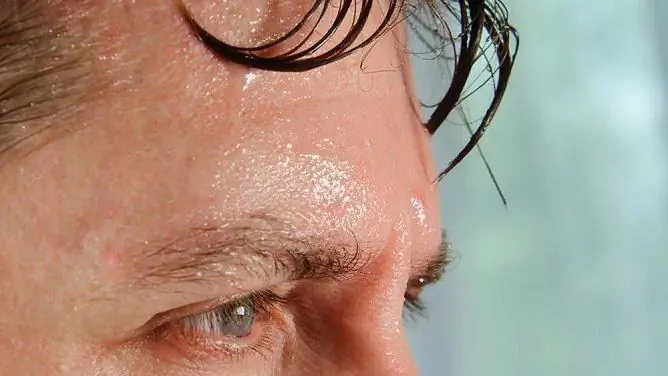- Author Rachel Wainwright wainwright@abchealthonline.com.
- Public 2023-12-15 07:39.
- Last modified 2025-11-02 20:14.
Why does the baby's head sweat during feeding and sleep
The content of the article:
- Individual characteristics
- Rickets
- Overactive thyroid
- Inflammatory diseases (viral, bacterial and other etiology)
- What to do with excessive sweating in a child
- Video
The baby's head sweats for various reasons, but most often this is a variant of the norm and does not indicate the development of serious pathologies.

In most cases, it is normal for a baby to have head sweats.
The process of sweating is the most important component of the thermoregulation system in the human body, due to which a stable body temperature is maintained. However, in infants, this system is not completely formed, which is why they are more susceptible to overheating or hypothermia.
Excessive sweating in infants can be triggered not only by high ambient temperatures, but also be a symptom of serious diseases such as rickets, hyperthyroidism, tuberculosis and other infectious and non-infectious pathologies.
Individual characteristics
With a normal microclimate in the room, diagnostically proven absence of diseases, we can say that hyperhidrosis is not a sign of pathology in a child, especially if one of the relatives also has such a feature from birth.
This conclusion can be made only after excluding other reasons that can harm the health of the baby.

Increased sweating can be observed during feeding
Normally, the baby's head sweats in the following cases:
| Cause | Description |
| Fatigue while feeding | Due to the fact that the crumb spends a lot of energy |
| Small amount of milk in the mother's breast, difficulty passing it, or a small hole in the nipple on the bottle | As a result of such stress, the child may sweat the back of the head, sweat on the forehead. |
| Acute respiratory infection suffered the day before | Symptoms of hyperhidrosis may occur until complete recovery. |
| Physical and emotional fatigue | A child may react to excessive physical and emotional stress with increased sweating |
| Taking certain medications | Hyperhidrosis can be a side effect or a consequence of taking antipyretics |
| Wearing unnatural fabrics |
Synthetic materials are less ventilated, which leads to poor circulation of warm air from the surface of the newborn's body |
Rickets
If the baby's head sweats during feeding, sleeping, constantly wet palms, feet and head, it is necessary to exclude the pathology of vitamin D metabolism, since these symptoms may be the first signs of rickets (vitamin D deficiency), especially if the child was born in autumn-winter period.

With rickets, in addition to hyperhidrosis, other symptoms are noted, including tearfulness and anxiety.
Along with excessive sweating, symptoms such as constant anxiety, tearfulness, poor sleep, decreased appetite (the child is reluctant to breastfeed, suckles sluggishly), and constipation may occur.
Baldness of the occiput or the part of the head on which the child sleeps is characteristic. This is due to increased sweating of the scalp, which leads to itching and involuntary friction of the head against the pillow. Late symptoms include decreased muscle tone, soft scalp, and bone deformity.
Overactive thyroid
The thyroid gland, which performs an endocrine function (secreting hormones), directly affects the basal metabolism. With its hyperfunction, increased heat production is observed, and, consequently, hyperthermia (increased body temperature), which the body tries to compensate by increasing heat transfer through increased secretion of sweat by the sweat glands.
Most often, thyrotoxicosis, which is detected in the first month of life, is congenital (in the case of hyperthyroidism in the mother during pregnancy) and must be diagnosed in the perinatal center.
Inflammatory diseases (viral, bacterial and other etiology)
The reproduction of pathogens in the baby's body is almost always accompanied by a temperature reaction, and, accordingly, strong sweating.
In the absence of vaccination according to the vaccination schedule, especially if the child is bottle-fed, the risk of infections (often with airborne transmission) increases several times.
Any infection to one degree or another weakens the baby, it becomes more difficult for him to perform various movements. Sucking, crying and other vigorous activities require more energy and, therefore, may be accompanied by the appearance of sweat on the back of the head and other parts of the body.
What to do with excessive sweating in a child
If a baby's head sweats, it is initially necessary to exclude overheating, which usually occurs for two reasons: the first is an increased air temperature in the room, the second is an excess of clothes on the baby. The optimum air temperature in the room where the baby is located should not exceed 25 ° C (average 22 ° C).

Excessive sweating may be associated with overheating
Many parents adhere to the incorrect myth that it is necessary to dress a baby one more layer of clothing than an adult puts on himself. In such conditions and at temperatures above 22 ° C, the child will definitely overheat, so one layer of clothing will be enough.
If you experience symptoms of rickets, you should urgently seek help from a doctor. Timely treatment with an oral solution of vitamin D allows to exclude further complications and the development of bone deformities.

Vitamin D is prescribed for children with rickets symptoms
With established thyrotoxicosis, inpatient treatment or intensive therapy (depending on the severity of the condition) with drugs that suppress the production of thyroid hormones is carried out.
In case of anxiety, irritability, poor sleep, appetite, excessive sweating, fever, coughing and other additional symptoms, mom should definitely consult a doctor for diagnosis and follow his instructions in the future.
Video
We offer for viewing a video on the topic of the article.

Anna Kozlova Medical journalist About the author
Education: Rostov State Medical University, specialty "General Medicine"
Found a mistake in the text? Select it and press Ctrl + Enter.






